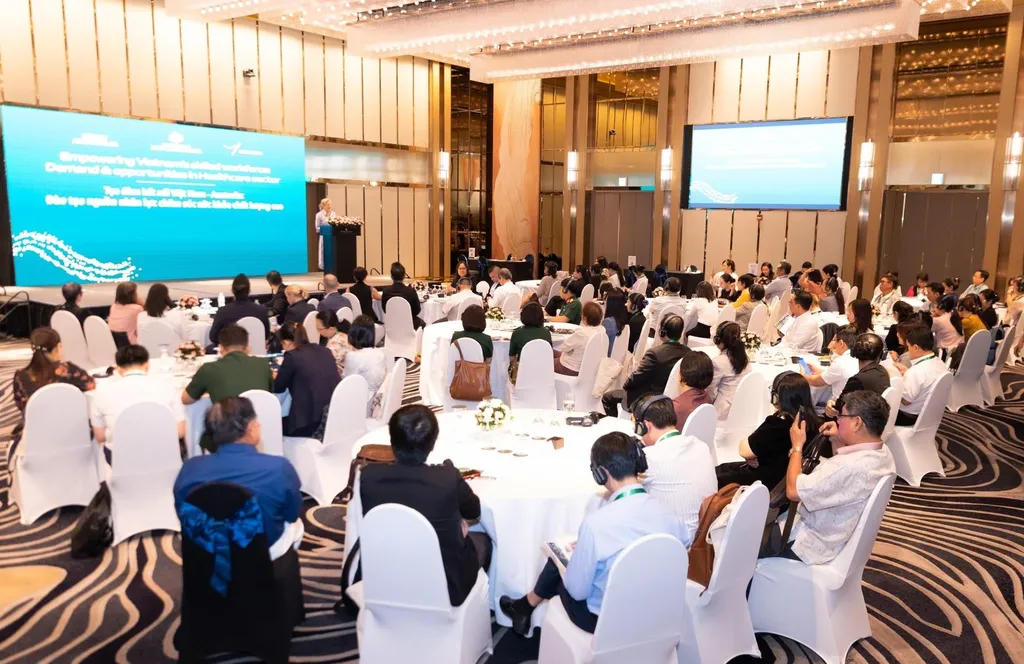 advertisement
advertisement

 |
| Austrade’s Forums in Hà Nội and HCM City attracted Vietnamese representatives. — Photo Courtesy of VET |
HCM CITY — As Việt Nam faces a rapidly aging population, the need for an efficient and skilled healthcare workforce is becoming increasingly urgent. Through the “Enterprise Enabling Model,” Australian Vocational Education and Training (VET) providers are well-positioned to collaborate with Việt Nam, offering tailored solutions to meet the demands of an aging society.
The rising need for healthcare professionals in Việt Nam
Việt Nam’s demographic trends reveal a significant shift: the proportion of elderly people in the population is growing faster than ever.
According to the World Health Organisation, by 2050, the number of people aged 60 and older in the country is expected to surpass 30 per cent of the total population. This shift poses considerable challenges to the country’s healthcare system, which must adapt to provide comprehensive care for an increasingly elderly population.
To address these challenges, Việt Nam requires a well-trained, highly skilled healthcare workforce capable of meeting the diverse needs of older adults. This is where Australian VET providers can play a crucial role.
Australia’s VET system stands out for its comprehensive and effective approach to developing expertise in various fields. This presents a unique opportunity for collaboration between the two nations to address the long-term workforce gaps and ensure high-quality healthcare services as the industry continues to evolve.
The enterprise enabling model
In July, Austrade’s “Empowering Vietnam’s Skilled Workforce” forums in Hà Nội and HCM City addressed the “Enterprise Enabling Model” as a solution to bridge the gap.
An enterprise enabling model and potential tripartite arrangement, i.e., Australian VET provider – Industry partner(s) – Local VET provider, provides a sustainable approach to building employee capability from within an organisation.
This approach goes beyond providing traditional training services to working with organisations to understand, plan and jointly execute their human resource development strategy. Training services are aimed at equipping the organisation to sustainably uplift capability and expand capacity for future initiatives.
Chisholm Institute: Appointed by the Government of Việt Nam to deliver the Việt Nam TVET Reform Programme, Chisholm uplifted 25 vocational colleges to deliver internationally recogniseed qualifications meeting Australian regulatory standards. The programme saw 350 Vietnamese vocational teachers gaining a Certificate IV in Training and Assessment and 727 students achieving internationally recognised Australian qualifications. Chisholm developed competency-based curricula in consultation with Vietnamese industry, advised on upgrading college facilities, and provided ongoing quality assurance and mentoring for teachers.
Future Health Skills Project: This project, co-designed by health professionals, schools, technology experts, and instructional designers, was delivered by The Gordon Institute and health service organisations. It supported up to 760 clinical and non-clinical staff and 430 future workers, addressing core skill gaps recognised by the industry and strengthening relationships with major organisations in the region.
This collaboration between Australian and Vietnamese VET providers and industry partners offers several benefits.
By leveraging tailored training programmes, fostering partnerships, and building local capacity, this collaboration can help Vietnam address its healthcare challenges effectively and sustainably.
The integration of Australian VET capabilities into Việt Nam's healthcare system promises to enhance workforce skills and improve the overall quality of care for its aging population, paving the way for a healthier future.
Furthermore, the partnership strengthens international ties between Australia and Việt Nam, fostering mutual understanding and cooperation in addressing global healthcare challenges.
Visit StudyAustralia to explore Australia’s VET system.




